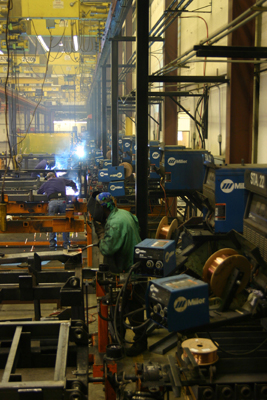 |
|
The Delta-Fab System’s ease-of-use will help Champion Hoist & Equipment increase their output from 8,000 to 30,000 hoists per year.
|
Truck-building entrepreneur Pat Godwin, Sr., doesn’t hesitate to share the secrets of his success. “What got me ahead was hard work, honesty, loyalty, paying my bills, earning repeat customers and treating people right.”
From these simple principles, Godwin built his version of the American dream. They allowed him to grow from a backyard fabricator—who had to unplug his stove to plug in his welder—to one of the largest hydraulic truck body builders in the country, the Godwin Group of Dunn, N.C.
Godwin’s philosophy continues to work. He remains largely unaffected by economic changes, sustaining double-digit growth for decades. He also remains unaffected by the steel shortage. The steel companies kept this prompt-paying customer well supplied.
Under the Godwin Group, Pat Godwin, Sr., owns six companies, including two he built himself. Godwin Manufacturing Company, Inc. directly evolved from his backyard welding shop and now specializes in small, mid-sized and large dump bodies. Champion Hoist & Equipment used to be part of Godwin Manufacturing, but Godwin recently split off this company into a separate entity that will supply hoists for internal needs and the industry in general.
To equip the new Champion Hoist facility’s 22 MIG welding stations, and to add 40 more welding stations for Godwin Manufacturing’s new elliptical truck line, Godwin turned to Jeff Johnson at Machine & Welding Supply.
“I don’t build welders. I build trucks. Machine & Welding Supply knows welders, they know my business and I trust their recommendation,” says Godwin.
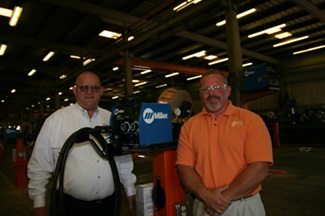 |
| (Above) Pat Godwin, Sr., (left) and Brian Jones of Machine & Welding Supply with a recently installed 24A wire feeder. The Delta-Fab System power source is mounted high up on a column (seen over Brian’s shoulder), freeing up floor space and improving work flow. (Above left) are welded, sand-blasted, powder-coated, installed and readied for delivery. |
Johnson recommended Miller’s Delta-Fab™ System because it fit perfectly with Godwin’s training and manufacturing processes.
“Mr. Godwin wanted to mount the power sources on columns where they’re out of the way,” notes Johnson. “This maximizes workspace, increases productivity and makes for a safer work environment. To accomplish this, he needed a system with both voltage and wire feed speed control at the feeder, which the Delta-Fab provides. However, the biggest benefit of the Delta-Fab is its ease-of-use. It’s simple to understand and operate, which is important considering Godwin will be hiring and training new welders to keep up with the company’s growth.”
Miller designed Delta-Fab System exactly for industrial companies like Godwin Manufacturing that value simplicity, reliability, cost effectiveness and the ability to remotely locate the wire feeder from the power source.
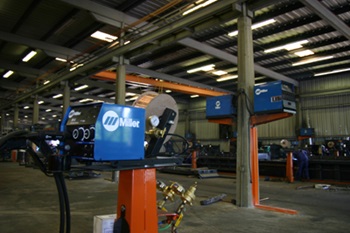 |
The Delta-Fab System allows the power source to be positioned remotely, making for a cleaner, safer work area, yet placing all of the controls the operator needs within easy reach. |
Sold as a package with power source, 24A wire feeder and a 400-amp Bernard Q-Gun (see side bar story on Bernard), the Delta-Fab offers an output of 375 amps at 100 percent duty-cycle (50 to 500 amps). It has a voltage range of 10 to 45 V—more than any power source in its class—to combat the voltage drop that occurs when stationing the power source long distances from the feeder. The Delta-Fab’s strong output also allows for greater flexibility with large wire diameters that require more voltage. The Delta-Fab is ideal for .035-in. to .045-in. hard and stainless steel wires and 1/16-in. flux cored wires. The 24A’s four drive-roll system provides positive feeding for wires .045 in. and larger.
At Champion Hoist, all of the Delta-Fabs run .035 in. diameter solid wire for welding steel ranging from 10 gauge to 3/16-in. thick.
The Value of Remote Control
Before acquiring, Delta-Fabs, Godwin Manufacturing relied primarily on Miller’s MP30E MIG welders. “The MP30Es have had many miles of wire run through them,” says Bob Bell, general manager. “They were the units of the their time, just as the Delta-Fab is today. One place where the Delta-Fab outperforms the MP30E is their ease of use. The MP30E’s voltage control is on the front panel. Since we mount the power sources off the floor or against the wall, this required the operator to reach up with a stick to adjust voltage, get a ladder or leave the workstation. Now with the Delta-Fabs, we have a much better arrangement where operators have total control at their fingertips.”
Godwin Manufacturing and Champion Hoist take full advantage of the Delta-Fab System’s remote control capability. The power sources are mounted about 10 ft. high on posts, reducing the amount of contamination they might be exposed to and allowing forklifts to freely drive underneath them. Cables are run under the floor to the wire feeders, which are mounted on pedestals. This keeps the cables out of the way of forklifts (a common and costly cause of cable damage) and out from under the operators’ feet, which eliminates a potential safety hazard.
All of wire feeders are fed an 80/20 argon/CO2 mix through a manifold system designed and built by Godwin himself. Each feeder has its own gas regulator and flow meter. All of the controls the operator needs are on the feeder and are easily accessible.
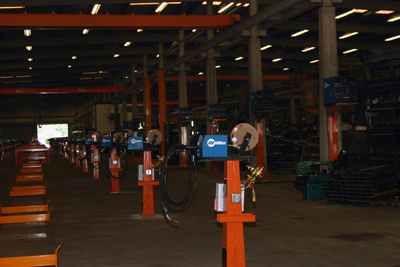 |
| The lack of cables along the floor or overhead dramatically improves Godwin Manufacturing and Champion Hoist's workspace. |
The result is a simplified and open workspace. This promotes smoother workflow and allows the welding operators to maintain their high piecework rates. This is especially important at Godwin Manufacturing and Champion Hoist, since many of its welders had little or no prior welding experience before going through the company’s training.
The Value of Training
Godwin Manufacturing added about 50 employees in the first quarter of 2006, with another 80-100 by July 4. Twenty-five welders have recently been added at Champion, and Godwin expects the number to grow by 140 in a year to meet the increased demand for hoists. New employees are hired on their work ethic, not necessarily past welding experience. In fact, finding this many welders in any area on short demand is almost impossible.
“All I’m looking for is a person that’s willing to learn,” Godwin says. “Often, if you hire someone who’s experienced, he thinks he knows it all and doesn’t want to learn how to do it your way. Here, you have to do it my way. I trained about 85 percent of my supervisors. Now they’re doing the teaching. Most of them came straight from high school, and they’re still with me. Some have been here 35 years.”
Under the direction of a supervisor, trainees at Godwin Manufacturing begin by learning to weld in a flat position for a truck underbody. Here, where cosmetics aren’t as important, the trainee concentrates on becoming familiar with the welder and on achieving proper weld penetration.
“Soon, the fear of the unfamiliar goes away and good things start to happen,” Godwin says. “As the training continues, we upgrade our welders to jobs where cosmetics are as important as good penetration.”
Entry-level welders begin at a minimum of $12 an hour. However, since they’re paid based on productivity, they can make as much as $25 or $30 an hour. The average for all welders is $16.54.
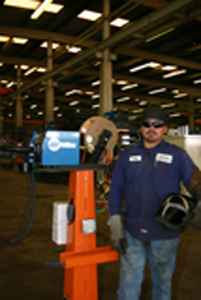 |
Hugo Escabera (pictured here with the Delta-Fab’s 24A wire feeder) is paid on a piecework basis. Godwin welders are some of the highest paid in the North Carolina. Reliable, operator-friendly equipment helps make that possible.
|
At the new Champion Hoist & Equipment facility, weld specifications are more stringent. Champion Hoist manufactures conversion or “scissor” hoists that go under a flatbed or small contractor truck dump body. Since the welding operators build pressurized hydraulic systems, they have to have prior experience and pass a welding test before being hired.
“All welds are important, but on a hoist they’re really important because a mistake can cause serious injury,” says Bell. “All of Champion’s welders have to pass a pretty extensive test, which we administer, and then they still go through supervised training.”
Brian Jones of Machine & Welding Supply notes that the Delta-Fab system helps both new and experience welders. “The Delta-Fab front panel only has an Off/On control. There are no other switches that can create confusion for trainees,” he says. “As for the wire feeder, there are only two controls: voltage and wire feed speed, with values displayed in bold numbers on the feeder’s digital meters. An experienced operator will like the Delta-Fab because it has an excellent arc for any MIG or flux cored process.”
When operators change from flat to vertical-down welding, they may need to change parameters to keep the puddle from becoming too fluid, but many operators keep the same settings and vary only their travel speeds.
The Value of Hard Work
Godwin’s dedication to training new welders and to his distributor isn’t surprising given his history. After leaving the family farm, Godwin married and took a job driving a soft drink truck. With Machine & Welding Supply on his route, he became interested in becoming a welder. He set his sights on a $129 Stick welder that Emmett Aldredge Sr., the owner, offered to him at a rate of $5 a month (perhaps the last time Godwin didn’t pay cash). Since Godwin had little or no welding experience, Aldredge helped him with the procedures.
“I’d knock on the door and say, ‘Mr. Aldredge, I’m trying to weld cast iron and I don’t know how,’” Godwin says. “He’d go through all of the procedures with me, what rod to use, how to use it. He really helped me a lot. That’s how I started. I did little odds and ends here and there.”
At the same time he was working on his route, he offered fabrication services from an 18’ x 22’ building in his backyard. Given the limited electrical service to the house, he had to unplug the family stove in order to plug in the welder. After about a year and with two children at home in diapers, he had a falling out with his boss at the beverage company. He went home on April Fools’ day and told his wife he quit his job.
“Once she realized it wasn’t a joke, she cried for a week,” he remembers. “It was a big move, but I never worry about things like that. I can always make it happen. I’m very aggressive and I’m not lazy.”
It was a shaky start, but not the only one in his career. “There’s an old saying, “If you have a bad start, you’ll have a good ending,’” Godwin says. “At the beverage company, I asked to be put in the welding shop until a route opened up. Within 15 minutes of my first day, I cut my finger off. That’s my bad start. With the first truck body I built, I had to take a lien against the customer to get my money, and that was another bad start.”
Soon, with the bad starts out of the way, Godwin’s business grew. In the first 20 years, he experienced an average of a 19.75-percent increase per year, adding customers and employees as he went. Initially the customers were farmers who were buying truck bodies. Then he had the opportunity to bid on a truck contract for South Carolina
“I believe there’s a star
in heaven for me,” Godwin says. “I make friends with people. I help them, and they help me. One of my vendors passed the bid specifications for the truck contract on to me. Although I had never built a truck body before, I submitted a bid and was successful. After the first four or five years, other states heard of me, and I got the contract for the state of Tennessee for 11 years. The business kept growing, even though I had very stiff competition then. Now I own the stiff competition.”
 |
| With a remote power source, the Delta-Fab System frees up workspace, giving the operator more freedom of movement. |
Godwin, who was able to buy R/S Body and Galion Dump Bodies in lean economic times, has a simple philosophy. ”When times are good, like they are now, I’m the most conservative. I watch costs and build cash. Then, when everyone else is going to the wayside and can’t pay their bills, I buy them. I always say, grow steadily, spend your own money and you won’t go broke.”
In 1970, Godwin toured a hoist manufacturing plant, asked a lot questions, then returned home and decided to build his own. Last year, Godwin built about 8,000 hoists. Three years from now, with the newly formed Champion Hoist & Equipment now in place, he plans to build 30,000/year, half for the companies in the Godwin Group and half for outside sales.
The Godwin Group now makes about 80 different body types. Among other accomplishments, it is the largest snow moving truck manufacturer in the United States, handling about 87 percent of the municipality market share. His success has been noted among his competitors.
“People in the business come to see me to see how I do it,” Godwin says. “I don’t have any secrets. They can’t beat me even after they see my facilities. ‘I’ll still beat you. I’ll eat your lunch,’ is what I tell them.”
How?
“Hard work, honesty, loyalty, paying your bills, earning repeat customers and treating people right,”